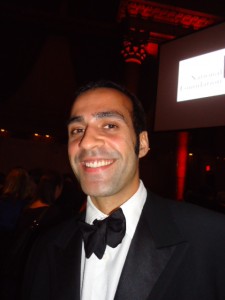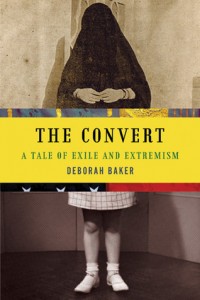I met Aatish Taseer
in New York last year, at the prize-giving ceremony of the National Book Awards of the USA
(my wife’s book, The Convert,
was on the short list).
I was pleased to meet Aatish because I had recently read his 2011 novel Noon. I had liked it very much and that had made me eager to read Stranger to History, which was published earlier, in 2009. But it was only recently that I got around to it: I was lucky to have it with me on a couple of long flights.
Stranger to History is the story of multiple quests: starting with a search for a ‘lost’ Pakistani father, it evolves into an inquiry that is simultaneously personal, familial, historical, religious and political. It sends Atish off on journeys that take him to Turkey, Syria, Saudi Arabia, Iran and finally Pakistan.
In Teheran Aatish meets a disparate crowd of party-goers, film-makers, former revolutionaries and members of the Hare Krishna movement. They paint an unexpected picture of their country. One of them says to Atish: “The people suffer from a kind of schizophrenia… in the day even a little girl has her head covered in school and has to learn about religion, but when she comes back there’s no religion and she takes her headscarf off… Have you seen the mosques? … They’re empty except for a few people and Basiji. People use them as bathrooms.”
Another man says to him: “You know what happened in Iran?… People were very connected to religion even though the government was not religious. But now that the government is religious, most of the people want to get away from religion. They see it as killing people, putting journalists in jail. That is the true religion. It is very hard for me to say I am a Muslim. Most of the terrorists today are religious. I prefer to say I have no religion.”
This leads Aatish to a bleak conclusion: ‘When I saw that Iranians were no longer looking to religion to solve their problems, I concluded that they were on a healthier path than other Muslim countries I had visited. But though the mosques were empty in Tehran, though I hardly ever heard the call to prayer, never saw a woman fully veiled or a man with a beard, unless he was a government man, the revolution had not been kind: it had brutalized its children.”
Later he writes: “Though Iranians had not known the great machines of socialist and Fascist repression, they knew a subtle, daily harangue. That it was conducted in the name of Islam was a great pain: the people’s deepest allegiances were used to subdue them, their religion turned to nonsense. It left a terrible vacuum.”
I spent some time in Teheran in the early seventies , when the Shah was at the height of his power. It was a very different country then, oppressive in another way. But Aatish’s portrait of Teheran – “a modern city, full of energy, anonymity and menace” – was instantly recognizable to me, as indeed were some of the people he met.
Aatish’s journey leads him on to Pakistan: ‘it amazed me now that the journey which had begun in Europe… had yielded the subcontinent, Lahore and, even more miraculously, my father.’
The Pakistani parts of the narrative are conflicted in ways that mirror the relationship between India and Pakistan. But this is exactly what gives the book its power and interest: as the child of an Indian Sikh and a Pakistani Muslim, Atish embodies, in his person, the tormented history of the Punjab.
The ‘lost’ father is Salman Taseer, an important figure in Pakistan. When Atish finally meets him, he proves to be everything that he expects – charming, impressive, brilliant, larger-than-life. But he is also, in some ways, disappointing, even though he and his family go out of their way to be generous and hospitable.
Salman Taseer explains that he is a ‘cultural’ Muslim, rather than a pious believer. That is to say, while he is not personally religious, he feels a powerful sense of identity with the traditions of Islam. In a sense he is a familiar figure, a man who rarely prays but whose imaginative life is mapped on the grid of Islamic history: the kind of person who might enjoy a drink, but likes to listen to Sufi music and wants to travel to Sicily and Andalusia.
Aatish’s uneasy relationship with his father leads to the discovery that this too can be a narrow and exclusionary way of looking at the world. What makes the discovery poignant in Aatish’s case, is that it is couched as a personal rejection – it comes about through his father’s refusal to acknowledge that Aatish too might be ‘culturally Muslim’, and that he too might have a claim to being in some way Pakistani. This leads to a harsh summation: “Pakistan’s founders were not clerics and fanatics, but poets and secularists. It was from the most sophisticated Muslims of that time that the case for the country was made… For me, until I saw the faith’s unspoken hold on my father’s notions of history and politics, and the chauvinism it could produce, the idea would almost have been too strange to understand.”
The tragic irony of this is that Salman Taseer eventually proved himself to be one of the most courageous and open-minded men of his time, by calling for the repeal of Pakistan’s infamous blasphemy law. For this he was murdered, in cold blood, by a member of his own security detail, in 2011.
Did Salman Taseer’s encounter with his own half-Sikh, half-Indian son play a part in prompting him to stand up for tolerance and pluralism in Pakistan? Had he read the book and was he perhaps trying to address his son’s judgement of him? It is impossible not to wonder.
With Pakistan, as with his father, Aatish’s vision is sometimes clouded by his personal conflicts. But this only serves to make the story all the more poignant – it is as if he were trying to unmake a border that had divided his own heart.
Stranger to History is a remarkable book – touching, brave, honest, elegantly written and filled with political and historical insight.
Aatish Taseer: Stranger to History, Picador India, 2009.




Amitav Da, Nice review on Aatish Taseer’s book – Stranger to History. I came to know about him when his father was brutally killed last year. BTW I’d enjoyed reading your book The Glass Palace – very fascinating. Would look forward to reading your Triology.
Best regards,
Akinchan Sen, Melbourne
Very insightful and as usual loved reading you. In the article, the phrase “half-sik, half Indian” stopped me. Perhaps it describes the way the external world looks at him and not how he sees himself?
Dear Mr. Ghosh and Mr. Taseer,
I attended Delhi School of Economics in the 1970s as an 18-year old yokel who did not need attendant English commentary in order to understand what differential equations meant in economics. When I sought work in Delhi, my prospective employers asked me if I knew how to mix a dry martini or who had created the literary character Lord Emsworth. Fortunately, my employers in New York were more concerned with my ability to solve differential equations than with lack of bartending skills, or with unfamiliarity with Wodehousian arcana. Like Mr. Ghosh, I know both Delhi and New York, and like Mr. Taseer, I know both Delhi and Amherst, MA, where I taught mathematical finance. I believe I can tell you something about the contrast between Delhi on one hand and New York and Amherst on the other hand that I believe neither of you would guess. People with inadequate command over English in general, and unanglicized Indians in particular, are treated as human beings both in Amherst and in New York, a dignity that not many people are willing to accord to them in Delhi.
About a 100 years ago, when James Joyce was as old as Mr. Taseer is today, and when a much larger part of Ireland had been speaking English as a native language than is the case with India, Joyce had his alter ego in the Portrait, Stephen Dedalus, say the following:
The language in which we are speaking is his before it is mine. How different are the words home, Christ, ale, master, on his lips and on mine! I cannot speak or write these words without unrest of spirit. His language, so familiar and so foreign, will always be for me an acquired speech. I have not made or accepted its words. My voice holds them at bay. My soul frets in the shadow of his language.
As a fugitive from the fascist stranglehold of Anglicized Indians into the safe and alien remove here in the US, I have always wondered what happens to what the Anglicized Indians for a spirit when they write English words, and what happens to what the Anglicized Indians have for a soul in the shadow of English language.
Perhaps you would care to shed some light on the matter.